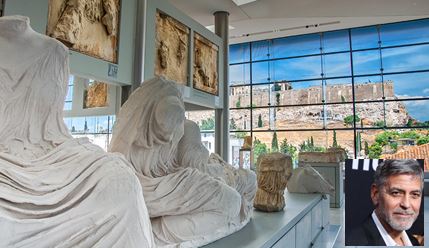Professor Armand D'Angour, is Professor of Classics at Jesus College Oxford, and as the newest member of BCRPM, outlines his thoughts on the continued plight of the Parthenon Marbles:
When I was at school studying Classics in the 1970s, the general view in the UK was that the Elgin Marbles had been legally acquired from the Greeks (via the Turks), that they were the essential centrepiece of the British Museum collection, that they had been nobly rescued from destruction by Elgin, that they were far safer in the clean air of London than in traffic-plagued Athens, and that returning them would set a terrible precedent that could lead to the world's museums being denuded.
Now, as a Classics Professor, I know that none of those arguments hold true. First, the acquisition by Elgin was for his personal profit and aggrandisement, and was dubiously legal - his alleged firman seems not even to exist; and it was completed through agreement with Turkish rulers of Greece and not Greeks themselves. Secondly, the display of the marbles in the Duveen Gallery is far from ideal; a colourful and well lit set of replicas would be much more appealing - not to mention the wonderful objects Greece might offer on loan in return, or a display of some of the BM's many other millions of objects currently in storage. Thirdly, the Marbles were not kept safe, but damaged with inappropriate cleaning fluids; the beautiful new museum on the Acropolis is a much worthier site today, and traffic is far worse in London than it is in Athens! Few objects have such iconic national status - and if they do, there would be a strong case for their return too to their place of origin.
These are arguments from common sense and history. The main arguments, though, that have persuaded me personally that the time has come for the reunification of the marbles in Athens are moral and emotional. It feels to many, Greeks and non-Greeks as if they are a vital part of the Greek land and soul; and that their theft by Elgin, compounded by a high-handed attitude to their return, remains an open wound.
The tale is told that when the Greeks were fighting for their independence, a group of soldiers observed the Turks stripping lead from between the stones of the Parthenon for use as bullets. Relatively uneducated and rustic Christians as the soldiers were, they felt strongly that this was a dreadful desecration of this pagan monument that had eternal significance to Greeks. They sent a delegation to the Turkish commander with a box of bullets - the very means of their own possible deaths - telling him that they would prefer them to be used than for the great ancient monument to be fatally damaged. Unhistorical as this anecdote undoubtedly is, the fact that it has often been told by Greeks is indicative of their strong feelings about this unique monument.
The emotional resonance of the Parthenon to Greeks - something increasingly recognised and appreciated by British people - makes for me one of the strongest cases for the reunification of the Marbles.






Comments powered by CComment